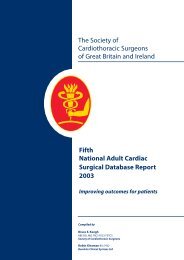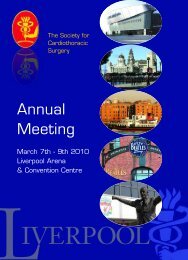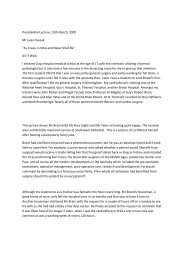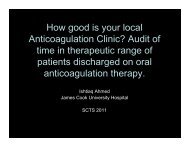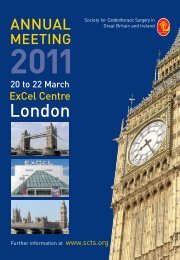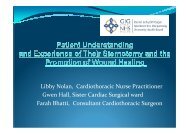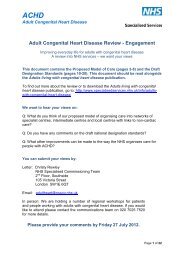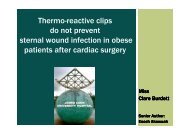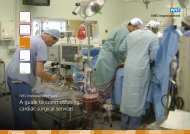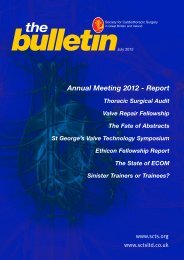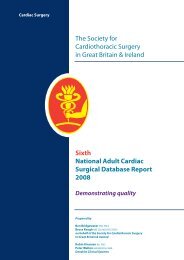Download - Society for Cardiothoracic Surgery
Download - Society for Cardiothoracic Surgery
Download - Society for Cardiothoracic Surgery
You also want an ePaper? Increase the reach of your titles
YUMPU automatically turns print PDFs into web optimized ePapers that Google loves.
July 2010 43<br />
President’s Address continued<br />
he was 23 years old. It functioned <strong>for</strong> 37 years be<strong>for</strong>e being<br />
replaced. J B S Haldane in 1939 in his book “Science in Everyday<br />
Life” said that “The problem of the artificial heart will be solved in<br />
the next 50 years”. He wasn’t quite accurate but the prediction is<br />
there. In 1963 the USA National Institute of Health started an<br />
official programme that they hoped would have a fully<br />
implantable artificial heart by Valentine’s day 1970. The first<br />
artificial heart ever implanted was by Liotta and Cooley (April<br />
1969). This actual heart is on display in the Smithsonian National<br />
Museum of American History. It was used as a bridge to<br />
transplant <strong>for</strong> 64 hours but the patient died 5 days post<br />
operatively (the typical outcome of transplant patients in that<br />
era). Up to the present - the Abiocor total artificial heart (no<br />
percutaneous cables / lines) received FDA approval in 2006 as a<br />
destination advice but it has a predicted life span of only 2 years.<br />
What has Airbus Industrie got to do with cardiac surgery? Some<br />
of you will remember that Professor Carpentier came to our<br />
meeting last year in Bournemouth and showed us the totally<br />
implantable artificial heart which the Airbus Industrie “Carmat”<br />
group have been developing over the last number of years.<br />
Interestingly he submitted the patent <strong>for</strong> this in 1986. He<br />
anticipates clinical trials by 2011. The technology is exciting but<br />
the impact on the NHS budget could be devastating.<br />
So what of the future <strong>for</strong> thoracic surgery? Valerie Rush, one of<br />
our guest speakers at the meeting published a paper last year<br />
which suggests that VAT lobectomy should be the standard of<br />
care. There was no difference in 5 year survival and patients had<br />
fewer complications and a shorter length of stay. If this is<br />
accepted it will have major complications <strong>for</strong> re-training my<br />
generation of surgeons.<br />
The Australians have recently lifted their moratorium on<br />
transplantation and a recent press release from the Alfred<br />
Hospital in Melbourne revealed that researchers have managed to<br />
keep pig lungs alive on a rig using human blood. They said<br />
“Experts believe animal to human transplants could be carried<br />
out within 5 years”.<br />
But let me finish with a little bit of reflection and philosophy. We<br />
all want to be happy – however we define happiness. The<br />
President of the Western Surgical <strong>Society</strong> in the USA in 2008 took<br />
<strong>for</strong> his Presidential Address the topic “Life, <strong>Surgery</strong> and the<br />
Pursuit of Happiness”. He referred to a survey which<br />
demonstrated that surgeons as a group had higher anxiety and<br />
depression scores. Of real concern was that this more apparent in<br />
younger surgeons – my generation need to take note and support<br />
our younger colleagues. For some reason orthopaedic surgeons<br />
seem to be immune! The survey also did not show any<br />
relationship between money and income and those who had an<br />
optimistic outlook had a lower mortality. Despite all the jokes<br />
about marriage and mothers in law, married men had a 7.2%<br />
lower mortality. The Pew Institute in the States have said that<br />
“Hectic pace, long hours and overlapping activities adversely<br />
impact on personal satisfaction”. A description of a current<br />
Consultant role in the NHS?<br />
The Economist Journal last year (19.09.09) had an Article entitled<br />
“Measuring What Matters”. It was discussing a commission on<br />
the measurement of economic progress and social progress set<br />
up by President Sarkozy of France in 2008. Members included five<br />
with Nobel prizes in Economics. They concluded that we needed<br />
to move towards measures of quality of life and not merely GDP<br />
(gross domestic products which measures the value of good<br />
produced in services).<br />
They also noted that rising incomes did not make people happier.<br />
Related to this topic was an article in BMJ Careers 21 which<br />
explored the public understanding of doctors. The first question<br />
was “Do you think doctors are overpaid?” The public were asked<br />
to rate doctors by specialty: GPs, Physicians, Surgeons. You will<br />
be gratified to know that only 1% of the public felt surgeons were<br />
overpaid (the lowest of the three group). Alternatively the<br />
question: “Do you think doctors work excessive hours? - 35% of<br />
the public said yes to Surgeons. Things were more balanced with<br />
Physicians and General Practitioners.<br />
Solomon in Ecclesiastes again: “Whoever loves money never has<br />
enough, who ever loves wealth is never satisfied with his<br />
income”. So we need to reflect on what is really important in our<br />
lives.<br />
Abraham Lincoln, the 16th President of the USA said “It is not the<br />
years in your life that count, it is the life in your years”. Along<br />
similar lines George Eastman, the founder of the Eastman Kodak<br />
Company said in referring to work/life balance: “What we do<br />
during our working hours determines what we have. What we<br />
do in our leisure hours determines what we are”.<br />
So I end as I started with a quotation from Ecclesiastes:<br />
“Naked a man comes from his mother’s womb and as he comes<br />
so he departs”.<br />
We work in a very exciting and rewarding specialty. We make a<br />
significant difference to our patient’s lives. We make a memorable<br />
impact on the trainees who work with us. We are very <strong>for</strong>tunate<br />
and in relative financial terms are well rewarded. However I would<br />
ask that we constantly remind ourselves of what is important in<br />
life and not allow work to overwhelm us. I have never met a<br />
Surgeon who in retirement says he wished he spent more time in<br />
the operating theatre.<br />
Members of the <strong>Society</strong> it has been a huge honour to be your<br />
President and I thank you <strong>for</strong> that privilege.<br />
Leslie Hamilton



